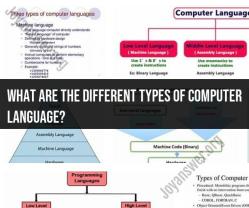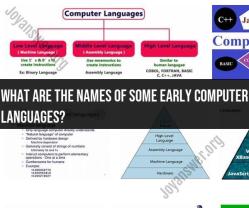What are the names of some early computer languages?
The early history of computer languages is fascinating and paved the way for the programming languages we use today. Let's trace the origins of some early computer languages and explore how they got their names:
Fortran (FORmula TRANslator):
- Developed in the mid-1950s by IBM, Fortran is one of the earliest high-level programming languages. Its name is derived from the words "formula translator" because it was designed for scientific and engineering calculations that involve complex mathematical formulas.
COBOL (COmmon Business-Oriented Language):
- COBOL was developed in the late 1950s. Its name reflects its purpose: to create a universal business language that could be used for data processing across different computer systems. It aimed to be a "common" language for "business" applications.
LISP (LISt Processing):
- Created by John McCarthy in the late 1950s, LISP is known for its symbolic processing capabilities. Its name, "LISt Processing," reflects its core feature of manipulating linked lists, a fundamental data structure in the language.
BASIC (Beginner's All-purpose Symbolic Instruction Code):
- John Kemeny and Thomas Kurtz developed BASIC in the early 1960s at Dartmouth College. The name emphasizes its simplicity and user-friendliness, making it an ideal language for beginners.
ALGOL (ALGOrithmic Language):
- ALGOL was developed in the late 1950s and early 1960s by a committee of European and American computer scientists. Its name, "ALGOrithmic Language," highlights its focus on algorithmic and mathematical computation.
Pascal:
- Named after the French mathematician and philosopher Blaise Pascal, this language was created by Niklaus Wirth in the late 1960s. Its name doesn't have an acronym, but it pays tribute to Pascal's contributions to mathematics and computing.
FORTRAN (FORmula TRANslator):
- For the second version of Fortran (Fortran II), IBM retained the "FORmula TRANslator" name, emphasizing its role as a language for scientific and engineering calculations.
C:
- Developed by Dennis Ritchie at Bell Labs in the early 1970s, the name "C" was derived from an earlier programming language called "B." C succeeded B, and the name was kept to indicate its evolution.
Ada:
- Named after Ada Lovelace, a 19th-century mathematician and the world's first programmer, Ada was designed in the late 1970s by the U.S. Department of Defense. The name honors Lovelace's pioneering work in computing.
C++:
- C++ is an extension of the C programming language, denoted by the "++" symbol, which in programming indicates an increment. The name implies that C++ builds upon the features of C.
Python:
- Created by Guido van Rossum in the late 1980s, the name "Python" was inspired by the British comedy group Monty Python. Van Rossum wanted a name that was short, unique, and slightly mysterious.
These early computer languages played a crucial role in the development of modern programming languages and software development. Their names often reflect their intended purposes, key features, or the historical context in which they were created.



